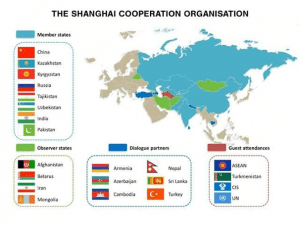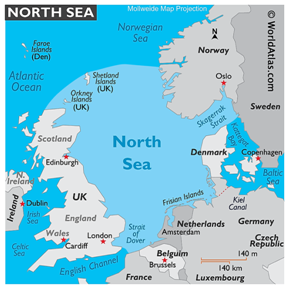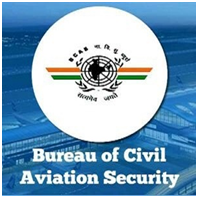INTERNATIONAL RELATIONS
1. SHANGHAI COOPERATION ORGANISATION INTERBANK CONSORTIUM (SCO IBC)
TAGS:GS-II- INTERNATIONAL RELATIONS- PRELIMS
THE CONTEXT: Recently, India appealed to SCO Interbank Consortium members to increase cooperation among themselves.
THE EXPLANATION:
- The SCO Interbank Consortium was established by the member countries of the Shanghai Cooperation Organisation in 2005.
- It provides funding and bank services for investment projects sponsored by the governments of the SCO member states.
- Objective: to provide financial services, promote trade, and facilitate investment among the member states.
- The SCO IBC Council meets ad hoc upon the consensus of all of the parties at least once per year.
- The Presidency of the Council is carried out on a rotational basis.
- It consists of major banks from the member countries, such as the Industrial and Commercial Bank of China, the National Bank of Kazakhstan, and the Bank of Russia.
- The first meeting of the SCO Interbank Association was held in Beijing on 21–22 February 2006.

2. NORTH SEA SUMMIT
TAGS:GS-II- INTERNATIONAL RELATIONS- PRELIMS
THE CONTEXT: Recently, nine European countries signed a declaration at the North Sea Summit.
THE EXPLANATION:
- The second edition of the North Sea Summit was held in the city of Ostend in Belgium.
- Participant countries included: Belgium, Denmark, France, Germany, Ireland, Luxembourg, Netherlands Norway, and the United Kingdom
- Objective: to make the North Sea the largest green energy centre in Europe by accelerating the deployment of offshore wind turbines.
- The summit set ambitious targets including the production of at least 120 gigawatts (GW) of offshore wind energy(UPCS CSE: Understanding Wind Energy) in the North Sea by 2030.
- The first summit was held in 2022 in Denmark.
- It resulted in the Esbjerg Declaration.

SCIENCE AND TECHNOLOGY
3. MARS’ CORE
TAGS:GS-III-SCIENCE AND TECHNOLOGY
THE CONTEXT: A new study has revealed fascinating insights into the innermost layer of Mars – its core. The Red Planet’s core is estimated to have a radius of approximately 1,780-1,810 kilometers, smaller and denser than previously thought. It is likely in a liquid state, according to the research published in the journal PNAS.
THE EXPLANATION:
The InSight Mars Lander
- In order to gain insight into the makeup and architecture of Mars, a team of international scientists scrutinized seismic information collected by NASA’s InSight Mars Lander, which was sent into orbit in May 2018. The lander put a seismometer and other geophysical equipment on the planet’s surface. Seismometers detect and measure seismic waves – shockwaves generated after an earthquake. As seismic waves pass through different materials, they behave differently, slowing down when they pass through liquid materials or hot regions.
Farside Seismic Events
- The team looked for ‘farside’ seismic events that occur on the opposite side of the planet to InSight. The team of researchers identified two seismic occurrences, one resulting from a marsquake and the other caused by a significant impact. Afterward, they compared the duration seismic waves took to travel through the core in contrast to those that remained within the mantle. Through the use of computer models, the team made projections concerning the physical characteristics of the core, such as its dimensions.
Composition of Mars’ Core
- The research found that light elements, sulfur, and oxygen, comprise a fifth of the core’s weight. Irwing explained that although both Earth and Mars are mostly made of iron, Mars’ core is less dense than Earth’s due to several factors, including the material that formed the planets.
GOVERNMENT SCHEMES IN NEWS
4. MAHILA SAMMAN SAVINGS CERTIFICATE (MSSC)
TAGS:GS-II- GOVERNMENT SCHEMES
THE CONTEXT: Recently, the Union Minister for Women and Child Development and Minority Affairs opened a Mahila Samman Savings Certificate (MSSC) account.
THE EXPLANATION:
- Mahila Samman Savings Certificate Scheme was announced in the 2023-24 Union Budget) to commemorate ‘Azadi Ka Amrit Mahotsav’.
- Objective: To empower women by increasing their participation in investments.
- It is a significant step towards financial inclusion and empowerment of women including girls. It is a one-time savings scheme.
- The two-year tenure scheme offers an attractive interest rate of 7.5 per cent compounded quarterly
- It will have flexible investment and partial withdrawal options with a maximum ceiling of Rs two lakh.
- The scheme is valid for a two-year period up to 31st March 2025.
- The scheme has been made available in all 1.59 lakh post offices from April 01, 2023.
Deposit limits:-
- One can start investing in this scheme with a minimum amount of Rs. 1,000 or any other amount in multiples of Rs. 100.
- But one cannot make additional deposits after that.
- Under this scheme, one can open multiple accounts, but the maximum total investment should be Rs 2 lakh only.
- And each account opened should have a three-month gap between the opening date of the existing account and the new account.
Eligibility Criteria:-
- The scheme is exclusively available to women.
- Any woman above 18 years of age can invest in this scheme by herself.
- Also, in the case of minors, the guardian can open the account on behalf of the girl.
PRELIMS PERSPECTIVE
5. BUREAU OF CIVIL AVIATION SECURITY (BCAS)
TAGS: PRELIMS PERSPECTIVE
THE CONTEXT: The Bureau of Civil Aviation Security (BCAS) is the national regulatory body for civil aviation security in India. It recently commemorated its raising day.
THE EXPLANATION:
A Brief History of BCAS
- The BCAS was established as a Cell in the Directorate General of Civil Aviation (DGCA) in January 1978 following the hijacking of an Indian Airlines flight in September 1976.
- The primary role of the cell was to manage and train personnel on Civil Aviation Security matters. In April 1987, the BCAS became an independent department under the Ministry of Civil Aviation in response to the Kanishka Tragedy in June 1985.
Responsibilities of BCAS
- One of the key duties of BCAS is to create aviation security standards in compliance with Annex 17 to the International Civil Aviation Organization (ICAO)’s Chicago Convention for airlines and airport operators, as well as their security agencies, responsible for implementing AVSEC measures.
- The BCAS also monitors the implementation of security regulations and carries out assessments to determine security requirements. The bureau ensures that security staff receives appropriate training and necessary competencies to perform their duties.
- In addition, BCAS is responsible for coordinating and planning aviation security matters, including conducting surprise and dummy checks to evaluate the proficiency and alertness of security personnel. The bureau also conducts mock exercises to test the effectiveness of contingency plans and the operational preparedness of various agencies.




